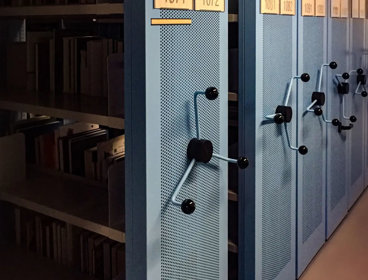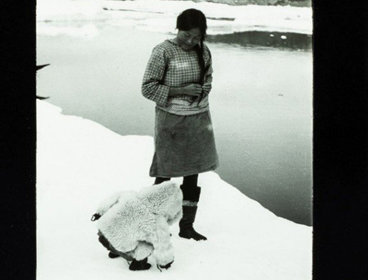Archives can provide a rich and valuable resource for geographical research. If you're considering an archive-based research project for the first time, this resource provides some advice and things to think about.
On this page
- What is an archive?
- How to find relevant archival materials
- Questions to ask before using an archive
- Preparing to visit an archive
- Taking photos in an archive
- What to expect on your first day of archival research
- Handling archival materials
- Working systematically
- Keeping a record of what you’ve looked at
What is an archive?
An archive is a collection of materials brought together for a purpose. These may:
- Document an event or activity
- Relate to an organisation or an individual
- Or have other purposes too. For instance, the Society's Collections include unpublished manuscript and typescript paper material, documenting the activities of the organisation, or belonging to key figures in the history of geography and exploration.
But archives can also look very different, encompassing:
- Many different types of material, including images, ephemera, sound, and video, as well as textual material.
- Many different locations, such as:
- Family archives
- Community archives
- Personal archives
- Oral history
- Other material formats
Institutions create archives for a variety of reasons, but generally speaking items are kept because they were important to someone for purposes including:
- Record-keeping
- Memory
- Making history
- Preservation
It is vital to remember that archives are not neutral spaces, but are shaped by power relations and the perspectives of people who created them.
Many archives have been digitised and so can be accessible online. However, sometimes these sit behind a paywall, or there may be other barriers to access (such as digital literacy and ability to navigate them).
You can find out more about a recent project to digitise the Society's Collections in partnership with Wiley Digital Archives, in our resource on using the RGS-IBG Wiley Digital Archives.
How to find relevant archival materials
There are a number of online search engines that will help you find relevant archival materials.
Both of these platforms allow you to search by the archives held in many UK national, academic and specialist libraries.
Specific institutions, for example, often also have search functions. For example, the Society has an online catalogue where you can search our Collections.
Questions to ask before using an archive
- What do I want to know?
- What is here? What am I looking at?
- Who put it together? And who decided to keep this?
- Why? For what purposes?
- What were their priorities?
- What is missing?
Preparing to visit an archive
Many archives require some form of identification and a proof of address in order to access their materials. For instance, new readers who wish to access the Society's Collections need to bring their photo driving licence or passport. Different archives may have different rules. Make sure you check what sort of identification you need to bring with you before you head to an archive. Information is usually available on the archive’s website, or you can email in advance if you are not sure.
Most archives also restrict what you can bring into them. For instance, food and water are often not allowed, nor are pens or loose sheets of papers. Again, make sure you check in advance what you can and can’t bring with you.
It can also be helpful to have a list of items you want to look at ready. This will save time when you get there and allow you to use your time most effectively. For many archives, you will need to order material in advance of your visit, so that it is waiting for you when you arrive.
Taking photos in an archive
Many archives have restriction on photography. This is often due to copyright restrictions on the material in them. Some don’t allow photos at all, while others allow it but require you to fill in a form explaining which items you’ve photographed or pay a small photography fee.
Make sure you check the specific regulations before you visit.
What to expect on your first day of archival research
Archives come in all shapes and sizes, so what to expect can vary a great deal. Bigger archives like the National Archives can seat hundreds of people and have many members of staff. Other archives are much smaller, sometimes with only one or two archivists.
Either way, archivists often know a great deal about the collections and it’s often worth explaining your research project to them, as they might be able to direct you towards relevant collections that you otherwise didn’t know about.
Handling archival materials
It’s important to handle archival materials carefully. Different archives will have slightly different rules or guidelines about how to handle their materials. As a rule, making sure you have clean hands is important, as is patience when handling delicate materials.
You may be required to wear gloves when handling photographs or artefacts. It’s always a good idea to check with the archivist if you’re unsure about how to handle a specific object or collection.
Working systematically
Working systemically is vital when studying larger collections. It can be really helpful to understand how a given collection is ordered: is it by date? Or is it alphabetic?
Understanding how a collection is organised can help you think about the best way to tackle it. How you do so will also depend on the kind of research questions you’re asking. Either way, it’s good to develop a system or strategy for examining a collection.
Keeping a record of what you’ve looked at
If you’re planning a long research project, it’s really helpful to keep a record of the documents you’ve looked at, even if they didn’t prove useful. This is particularly important if you’re doing a longer research project, where you might forget what you looked at on earlier on. This is also important for when you later write up your list of references or bibliography, so keep as more detail as you.
Have you worked with the Society's Collections? Do you have an interesting story to tell about what you’ve found? Contact us at rhed@rgs.org to let us know and find out more about how we share details of the fascinating research on our Collections.


